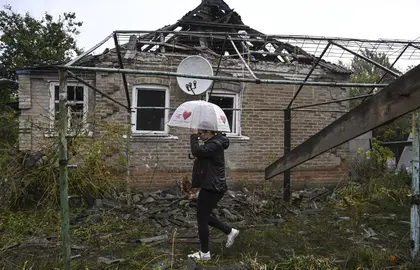I recently returned from the second trip in my life to the Donbas industrial region. We were in Kramatorsk, Donetsk Region, last time, and this time we visited frontline towns and villages. For security reasons, I will not name the locality and the names of the people we talked to.
This story took place in the middle of October. Together with my TV cameraman, I walked along the road in one of the villages half-destroyed by Russian shells, shaking every single minute from the explosion. We tried to find people who would tell us how they have been living here for the past eight months and why they had not gone to safer places. Some houses were without windows, some had no roofs, and in some places there were no houses at all – just holes and scattered stones in the yards.
This village was occupied by Russian-backed forces for only one month – back in 2014. And although the frontline has now moved further in favor of Ukraine, as I have already said, explosions do not subside here. Once every few days, shells fly through the village. And almost every arrival is accompanied by death…
Despite such a terrible picture, there is still a small group of people living in this village who are still waiting for Putin’s “Russian world” to arrive. They don’t even hide it. On the contrary, they threatened us, that we had better leave that village. However, since there are fewer and fewer such people there, we decided to go further.

EXPLAINED: What We Know About Russia’s Oreshnik Missile Fired on Ukraine
That’s how we met a man who looked like he was in his 50s at the end of one of the streets. He was chopping firewood, because winter is coming. There will be no heating in Donbas. In addition, no-one knows what the situation with electricity will be. Surprisingly, he welcomed us very happily – as if we were old friends. And immediately invited us into his house, where his wife was preparing fragrant borscht.
- Why don’t you go? – I asked as soon as we entered the house.
- We don’t want to, – answered the owner, – we have somewhere to go, we have money, but we are of more use here. And here we have a farm. Vegetable gardens. A cow. Dogs. And this is where we help the army.
I was interested in how they help the army, especially from here – from the village. And they spoke with fear and caution.
This family has lived in Donbas all their married life, which is more than 30 years. They started helping the military from the beginning of the Russian attack on Ukraine in the spring of 2014. When the village was liberated by the Ukrainian army, the family hosted our liberators in their home. Later, they exchanged contacts in order to bring them food in the future. The couple is still doing this.
The lady of the house, who was busy cooking borscht, said that during those eight years of armed aggression, they brought half of the food and profit they’d earned from their farm to the front.
- This is already a tradition. This is our duty. They do theirs, and we do ours. They help us and we help them. In eight years of the war, we have already had hundreds of soldiers. They are all like family to us. And the worst thing is probably when you find out that one of them is no longer there, – the woman said, shared her experiences.
But the family’s efforts to help have been most active during Russia’s ongoing full-scale invasion. At first, the military began to turn to them for help with lists of necessary things. And the couple, in turn, handed those lists to their son in the capital, where he and volunteers collected the necessary things. Subsequently, the activity expanded.
- Our son has connections in the Ukrainian special services. So we decided that they could be used in some way. In the first days of the war, a groupmate from Kharkiv Region called me and said that a convoy of huge Russian vehicles had just arrived at one of their facilities. I passed this information to my son. And by evening we had already received thanks for more than 100 units of Russian equipment that had been destroyed, – says the owner with delight.
The woman says it’s not possible to speak about everything while the war continues, but there were many such cases.
- On one occasion, the Russians laid mines in a certain area here, in Donbas. And I found out from my sources that the Ukrainian military will advance there. God, I must have brought everyone to their feet just to somehow have time to pass on this information. And you know? I did it!
If you’d had heard the enthusiasm with which the woman talked about this!!!
Now we talk on the phone from time to time. But we never talk about such things. We should be quite careful here. Besides, as I have said, the village where the family lives is situated very close to the frontline. And we don’t know how the war will develop in future.
But getting to know these people showed me one thing: it really doesn’t matter where you are or who you are, if you want to help – you will do it. Because everyone is useful in the place where they find themselves.
The views expressed in this opinion piece are the author’s and not necessarily those of Kyiv Post.
You can also highlight the text and press Ctrl + Enter






